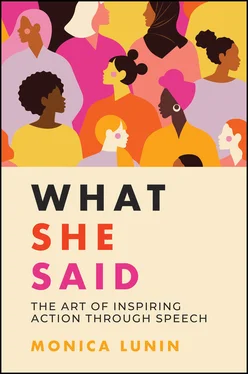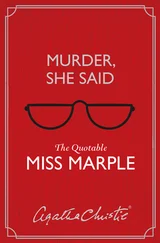Monica Lunin - What She Said
Здесь есть возможность читать онлайн «Monica Lunin - What She Said» — ознакомительный отрывок электронной книги совершенно бесплатно, а после прочтения отрывка купить полную версию. В некоторых случаях можно слушать аудио, скачать через торрент в формате fb2 и присутствует краткое содержание. Жанр: unrecognised, на английском языке. Описание произведения, (предисловие) а так же отзывы посетителей доступны на портале библиотеки ЛибКат.
- Название:What She Said
- Автор:
- Жанр:
- Год:неизвестен
- ISBN:нет данных
- Рейтинг книги:4 / 5. Голосов: 1
-
Избранное:Добавить в избранное
- Отзывы:
-
Ваша оценка:
- 80
- 1
- 2
- 3
- 4
- 5
What She Said: краткое содержание, описание и аннотация
Предлагаем к чтению аннотацию, описание, краткое содержание или предисловие (зависит от того, что написал сам автор книги «What She Said»). Если вы не нашли необходимую информацию о книге — напишите в комментариях, мы постараемся отыскать её.
What She Said
What She Said
What She Said — читать онлайн ознакомительный отрывок
Ниже представлен текст книги, разбитый по страницам. Система сохранения места последней прочитанной страницы, позволяет с удобством читать онлайн бесплатно книгу «What She Said», без необходимости каждый раз заново искать на чём Вы остановились. Поставьте закладку, и сможете в любой момент перейти на страницу, на которой закончили чтение.
Интервал:
Закладка:
Cover design by Wiley
Cover Image: © Angelina Bambina/Shutterstock
All speeches remain the copyright of their respective speakers and rightsholders and are reproduced with express permission, or under a fair use doctrine or a fair dealing exception. Where requested, some speakers and speeches are individually credited as:
Maya Angelou:“On the Pulse of Morning” from ON THE PULSE OF MORNING by Maya Angelou, copyright © 1993 by Maya Angelou. Used by permission of Random House, an imprint and division of Penguin Random House LLC. All rights reserved. Svetlana Alexeivich:Copyright © The Nobel Foundation 2015. Hannah Arendt:“What Remains? The Language Remains” by Hannah Arendt. Copyright © 2013 by Hannah Arendt Bluecher. First published in Was bleibt? Es bleibt die Muttersprache, Deutscher Taschenbuch Verlag, Munich, 1965. Translation by Joan Stambaugh © 1994 by The Literary Trust of Hannah Arendt Bluecher. Margaret Atwood: USA/Canada/Philippines:Copyright © O.W. Toad Ltd, 2008, Payback: Debt and the Shadow Side of Wealth, House of Anansi Press Inc. Rest of world:Copyright © Margaret Atwood, 2007, Payback: Debt and the Shadow Side of Wealth, Bloomsbury Publishing Plc. Brené Brown:© 2021 TED. To learn more about TED, visit TED.com. Nora Ephron:Copyright © ‘Be the heroine of your life’, Nora Ephron, 1996, Wellesley College. Betty Friedan:Copyright © 1976 by Betty Friedan. Reprinted by permission of Curtis Brown, Ltd. All rights reserved. Roxane Gay:© 2021 TED. To learn more about TED, visit TED.com. Naomi Klein:Copyright © ‘This Changes Everything’, Naomi Klein, 2014, Bioneers transcribed by permission of the author for this publication. Audre Lorde:From SISTER OUTSIDER by Audre Lorde – published by Crossing Press. Copyright © 1984, 2007 by Audre Lorde. Used herein by permission of the Charlotte Sheedy Literary Agency. Eva Moses Kor:Copyright © “Healing and Forgiveness” by Eva Moses Kor 2001 Candles and Holocaust Museum and Education Centre/Alex Kor. Dorothy Parker:The Publisher wishes to thank the National Association for the Advancement of Colored People for authorizing this use of Dorothy Parker’s work. Ruby Wax:© 2021 TED. To learn more about TED, visit TED.com. Malala Yousafzai:Malala Yousafzai, ‘Let us pick up our books and our pens’ (UN General Assembly, July 2013) by kind permission of the Malala Fund.
DisclaimerThe material in this publication is of the nature of general comment only, and does not represent professional advice. It is not intended to provide specific guidance for particular circumstances and it should not be relied on as the basis for any decision to take action or not take action on any matter which it covers. Readers should obtain professional advice where appropriate, before making any such decision. To the maximum extent permitted by law, the author and publisher disclaim all responsibility and liability to any person, arising directly or indirectly from any person taking or not taking action based on the information in this publication.
Introduction
Words have the power to change the world. A speech that is masterfully delivered, well timed and beautifully constructed can change someone's mind, open their heart and inspire them to act. Women and men have been making speeches and making a difference in the world around them for as long as civilisation has existed. It is time to hold up the speeches made by women, so often overlooked, to examine their power, extract their wisdom and spread them as examples for other women and girls.
Why I wrote this book
I have chosen each of the forty speeches included in this book for the lessons it contains. All of the women featured here used their voice, and their will, to bring about change in some way. I believe we should celebrate their commitment and their decision to speak up, without needing to interrogate the significance of their historic contribution.
My purpose is not to criticise either the content or delivery, and nor is it to suggest how the speech might have been done better. I don't provide any analysis of the opinions, ideology or beliefs of any of those whose words I have selected.
If you were to pull down from the bookshelf any anthology of famous speeches you would likely find the content overwhelmingly skewed towards men. I have found such speeches to be sources of inspiration and instruction throughout my life, but I have come to wonder if the gender imbalance is justified. Of course, we know that women, historically, have not enjoyed equality when it comes to positions of power or platforms for speechmaking, so perhaps that is our default explanation. Do you accept, however, that because women did not have a platform, they did not have a voice?
I have come to the realisation that, in my mind, I lived in a post-feminist world. I believed my teachers and my parents when they told me I could do whatever I wanted to do. The men in my life — my dad, husband business partner and close friends — have never dissuaded me of this belief. I have surrounded myself with empowered and intelligent women who have carved out their place in the world. But when you look at the facts — the number of women in leadership roles in business and politics, for example, or the pay gap and rates of violence against women — I recognised that I have been deluding myself.
So what can I do to close the gap? Well, speaking has always been my thing. I am particularly interested in the intersection of communication and leadership and in my professional practice I work with people to help them find their mojo. We can all learn from the great speakers who have gone before us, no matter their gender. It is my hope that this collection will help other women develop their communication confidence and skill through seeing examples they might be better able to relate to.
At first glance, you may think some of the speakers identified in the pages of this book are too different from you to provide any useful advice. What could Queen Elizabeth I, who reigned in the sixteenth century, possibly have to teach a young woman working hard to be noticed in her job? How could a business leader extract any meaningful insight from the stories shared by a Russian novelist? Could a lawyer or an engineer learn from the early suffragettes? When you dig a bit deeper, however, you realise we can all learn something from each of these speeches. And these lessons can be found when we examine each speech according to its persuasive intent.
How to use this book
This book is more than a celebration of the speeches given by women. It is also a practical toolkit that you can use to help you inspire, motivate or educate others. We never just speak for the sake of it. When making a speech to any number of people, large or small, you want them to feel something. Similarly, your presentations are delivered to achieve something. Whatever your purpose, you will find guidance from those who have gone before you.
The ten chapters in this book, each including four speeches, have been created to organise the collection into categories of purpose, rather than a simple chronological order. For example, in the following chapters you can find:
speeches that bestow guidance, advice and wisdom
expert speeches that show creative ways to share complex ideas, concepts and theories sparking interest from new audiences
inspiring speeches that honour all the women who have lent their voice to the advancement of other women in the waves of feminism
Читать дальшеИнтервал:
Закладка:
Похожие книги на «What She Said»
Представляем Вашему вниманию похожие книги на «What She Said» списком для выбора. Мы отобрали схожую по названию и смыслу литературу в надежде предоставить читателям больше вариантов отыскать новые, интересные, ещё непрочитанные произведения.
Обсуждение, отзывы о книге «What She Said» и просто собственные мнения читателей. Оставьте ваши комментарии, напишите, что Вы думаете о произведении, его смысле или главных героях. Укажите что конкретно понравилось, а что нет, и почему Вы так считаете.












